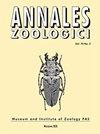分子系统发育支持螨超类群Eupodides的单系性,并与该类群的传统形态学定义高度一致
IF 1.3
3区 农林科学
Q2 ENTOMOLOGY
引用次数: 2
摘要
摘要纯足科(Eupodides, =Eupodina)由5个超科组成:bdello总科、eriophyo总科、eupodo总科、halacaro总科和tydeo总科。然而,这种分类系统还没有得到这些螨群系统发育的正式重建的支持。本文介绍了基于18S rDNA、28S rDNA和COI序列的长足虫主要谱系系统发育关系的研究结果。通过对分子分析表明的螨类群的主要形态特征进行批判性分析,我们重建了一个显示全足螨内部系统发育结构的枝进化假说的枝进化图。随后,将结果与在重建的分子树上对小叶螨的形态特征进行追踪所提示的性状进化过程进行了比较。根据我们的资料,Eupodides仍应被归类为bdello总科、eupodo总科、tydeo总科和eriophyo总科的一个单系分类群;然而,一些超科的分类地位尚未得到证实。特别是,在目前的分类学观点中,只有在蛭形科中嵌套有蛭形科的蛭形分支才可能符合超科。此外,真足总科和tydeo总科被证明是副足的。此外,在形态和分子上,还恢复了角形总科嵌套在tydeo总科内。本文章由计算机程序翻译,如有差异,请以英文原文为准。
Molecular Phylogeny Supports the Monophyly of the Mite Supercohort Eupodides (Acariformes: Trombidiformes) and Greatly Coincides with Traditional Morphological Definition of the Taxon
Abstract. One of the most phylogenetically enigmatic taxa of Trombidiformes is the supercohort Eupodides (=Eupodina) consists of five superfamilies: Bdelloidea, Eriophyoidea, Eupodoidea, Halacaroidea, and Tydeoidea. However, this taxonomic system has not been supported by formal reconstruction of the phylogeny of these mite groups. In this paper, we present the results of the phylogenetic relationships of major lineages of Eupodides based on 18S rDNA, 28S rDNA, and COI sequences. By critically analysing the key morphological features of the mite taxa indicated by molecular analysis as the main eupodine lineages, we reconstructed a cladogram showing the cladistic hypothesis of the internal phylogenetic structure of Eupodides. Subsequently, the result was compared to the character evolution course suggested by tracing the morphological characters of eupodine mites on the reconstructed molecular tree. According to our data, Eupodides should still be classified as a monophyletic taxon grouping representatives of Bdelloidea, Eupodoidea, Tydeoidea, and Eriophyoidea; however, the taxonomic status of some superfamilies was not confirmed. Particularly, only the bdelloid clade with Cunaxidae nested within Bdellidae may correspond to the superfamily in the current taxonomic view. Additionally, the superfamilies Eupodoidea and Tydeoidea were demonstrated to be paraphyletic. Moreover, morphological, as well as molecular, data recovered Eriophyoidea nested within Tydeoidea.
求助全文
通过发布文献求助,成功后即可免费获取论文全文。
去求助
来源期刊

Annales Zoologici
生物-动物学
CiteScore
1.60
自引率
27.30%
发文量
34
审稿时长
>12 weeks
期刊介绍:
Annales Zoologici is published quarterly by the Museum and Institute of Zoology at the Polish Academy of Sciences. It is an international journal devoted to all aspects of systematic entomology (in a broad sense).
 求助内容:
求助内容: 应助结果提醒方式:
应助结果提醒方式:


